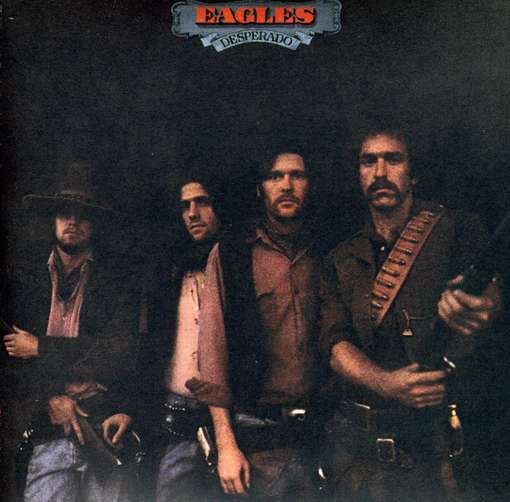
Desperado (1973)

1. Doolin Dalton
2. Twenty-One
3. Out of Control
4. Tequilla Sunrise
5. Certain Kind of Fool
6. Doolin Dalton (Instrumental)
7. Outlaw Man
8. Saturday Night
9. Bitter Creek
10.Desperado
11.Doolin Dalton/Desperado (Reprise)
Don Henley, years later, could often be found waxing reflective onstage during his solo tours, offering wry, gravel-voiced sympathies for the latest crop of teen idols — those shooting stars whose careers launched with a bang and usually cratered with equal velocity. In Henley’s view, they were all destined to go through, quote, “a whole lot of shit” — by which he meant the industry machine’s bottomless impatience for anything less than platinum on demand.
The irony, of course, is hard to ignore. For if ever there was a band who should’ve felt that sophomore squeeze, it was the Eagles. Their debut album produced not one, not two, but three Top Ten singles. By 1973, expectations were Everest-high. But the pressure, if felt, didn’t show. There was no scrambling attempt to reproduce the previous year’s success. Instead, they leaned into an idea — the mythical American West — and turned their second album into a conceptual homage to the frontier outlaw. The result was Desperado, and though it yielded fewer immediate hits, it stands now as one of their most enduring statements.
From the moment Doolin-Dalton slides in with its mournful harmonica and stubbled narrative tone, the listener is invited into a world that’s more cinematic than the band’s debut — less Laurel Canyon, more Dodge City. The harmonies are tighter, the arrangements more deliberate, and the storytelling instinct — that old country mainstay — is suddenly front and center. One suspects that Leadon had more than a hand in shaping the sonic aesthetic here. And if the Western motif teeters on the brink of pastiche, it never quite tips. That’s largely due to the craftsmanship of the material.
Twenty-One gallops in next, all two-step rhythm and porch-stomp bounce, a delightful bout of whimsy held in check by razor-sharp execution. Then — with almost shocking suddenness — Out of Control crashes through the saloon doors like a whiskey-fueled bar fight. Any notion that this is a “theme album” in the precious, prog-rock sense is quickly dismissed. This is hard rock, unrepentant and urgent — perhaps the most aggressive track in the Eagles’ catalogue. And yet, remarkably, it fits. Why? Because the band’s sonic fingerprint — those harmonies, that composure — makes even the most jarring detour feel like part of the map.
And then, of course, come the two tentpoles. Tequila Sunrise, that lilting ode to romantic resignation, and the song Desperado itself — arguably the band’s finest moment. The latter was never released as a single, a decision so baffling it could only have been made in an era before market research dictated everything. But the song’s immortality needs no chart validation. It is a miniature opera of Western fatalism, lifted beyond cliché by Henley’s weary restraint and the swelling orchestration that could have belonged to any of Morricone’s more reflective moments.
Elsewhere, we’re given a brief but brilliant instrumental reprise of Doolin-Dalton, performed at banjo speed with the sort of verve that makes one wish they’d kept going for a minute or two longer. But that, too, is part of the charm — Desperado never overstays its welcome. It moves like a short story collection: each chapter distinct, yet subtly interlinked by theme and tone.
Where their debut drew its strength from variety — rockers, ballads, barroom blues, and folk confessionals all jostling for attention — Desperado is more focused. It commits to a vision. And while some may miss the broader stylistic sweep of Eagles, few would argue that anything here is filler. Even the lesser-remembered tracks exude a quiet authority. There’s an elegance to the whole affair — the confidence of a band unafraid to define itself on its own terms.
In the final reckoning, Desperado may well be the album that best explains the Eagles' longevity. Not because it was their biggest — it wasn’t. Not because it had the most hits — it didn’t. But because it revealed something deeper: that beneath the radio-ready polish and chart calculus, this was a band capable of concept, cohesion, and craft. Desperado doesn’t ask to be liked. It already knows where it stands.
Go back to the main page
Go To Next Review